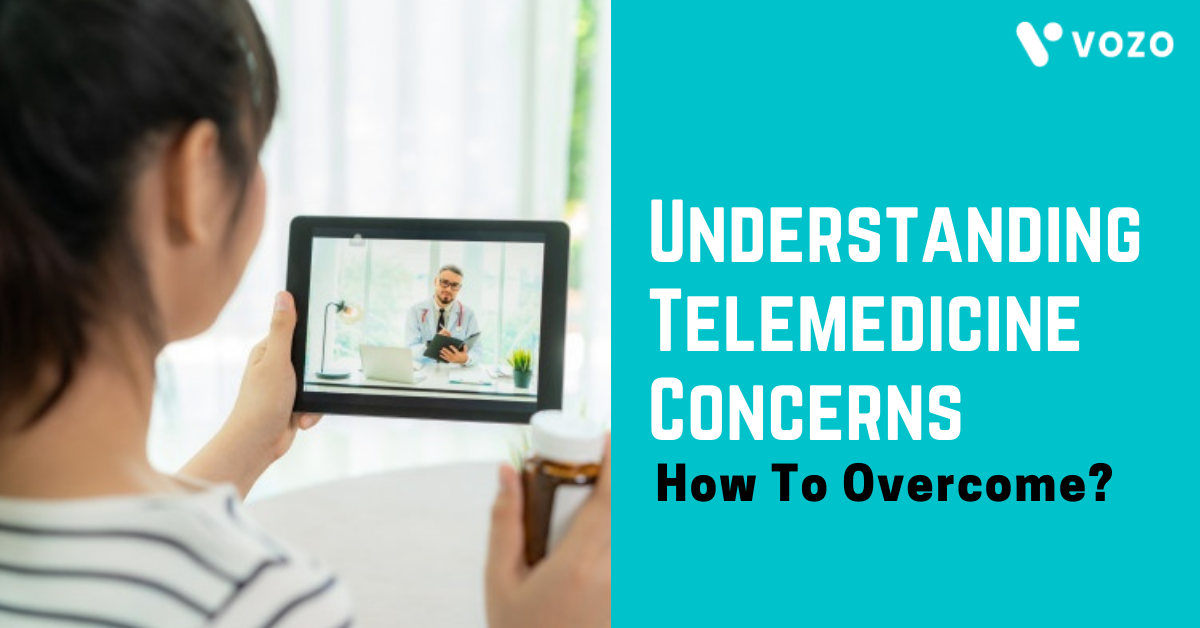Understanding Telemedicine Concerns: How To Overcome?
With the rise of digital technologies in the healthcare industry, telemedicine comes with easy to use features for both patients and healthcare providers. A recent survey reported that more than 50% of hospitals in the U.S uses telemedicine platforms due to their efficient healthcare services.
Telehealth increases practice productivity and more patient engagement. Even though there are numerous benefits with the telehealth platform, it also has some concerns in offering quality care to patients. In this article, we discussed briefly the telemedicine concerns and the possible ways to overcome them.
Why Telehealth Is Important?
As innovation propels, medical services development has extended its convenience. In any case, there are new expanding torments for programs at each degree of care. For clinical administration, telemedicine services are getting increasingly important. Telehealth benefits emergency care patients distantly when medical services suppliers and patients are not present.
Nonetheless, the present COVID-19 pandemic has changed the healthcare consultation from eye to eye to screen-to-screen insight. At present, telehealth covers a larger portion of the market today. Consequently, there are significant and sensible worries that medical care suppliers and patients ought to survive.
1. Clinical Reimbursement
With telemedicine administrations, it gets hard for suppliers and doctors to get repaid. For example, Medicare furnishes telemedicine repayment inclusion alongside impediments.
It is conceivable to repay costs for administrations remembered for the Medicare Chronic Treatment Program, for example, administrations for patients within any event at least two ongoing sicknesses. These infections should endure for in any event at least one year, or till the very end, to consider repayment claims.
To beat obstructions to cost recuperation, it will assist with possessing a settlement program that contains utilizing innovation to more readily find the repayments claims. You can utilize a stage that screens those expenses to accurately record the receipts needed by insurance agencies while, simultaneously, being aware of repayment claims.
RELATED: The Ultimate Guide To Telemedicine Reimbursements
2. Absence Of Integration
You presumably face challenges in your work process because of an absence of EHR integration. Your electronic health records (EHR) doesn’t appropriately incorporate with the stage that you are utilizing to convey telehealth services.
If you are new to implementing telehealth software for your practice, then outsourcing is the best option and the outsourcing organization will help you in integrating your telehealth platform with EHR. Accordingly, this helps you record the work process and guarantee that each visit is accurately recorded and updated for future health appointments.
3. Absence Of Information
The absence of telehealth platform integration can likewise disturb the continuity of care. For instance, assume a patient gets telemedicine from one specialist organization yet picks another for the following electronic visit. All things considered, the subsequent specialist might not have all the data expected to analyze the patient’s concern.
However, to overcome this challenge you need to discover where your patient has gotten past telemedicine administrations, remembering those set up for clinics and associations that offer types of assistance with other medical services suppliers.
4. Absence of Technical Skills
Telemedicine administrations are given even in distant regions where there is an absence of specialized aptitudes. Generally in these regions, patients don’t see how to utilize telemedicine administrations.
However, it can diminish usage and block availability. To encourage this, it is ideal to overview your patients before the start of telemedicine services. Get some information about which gadgets they use while getting to your telemedicine administrations. Likewise, it is similarly essential to prepare your staff to help patients who need assistance without any problem.
5. Security Concerns
More often than not with telemedicine administrations, your patient information isn’t ensured, causing protection issues while getting to persistent information through the web. In any case, to beat protection issues, there are security rules gave by HIPAA. By keeping these guidelines, your data accumulated through a telemedicine administration is scrambled.
RELATED: Telehealth Software : Top 10 Must Have Features
6. Patient Awareness
The main challenge in telemedicine adoption is patient awareness. Your patients won’t be aware of the list of features available with the software. About 96% of enormous organizations plan to offer telemedicine arrangements with their representatives. This is only a botched chance when your patients don’t know that you’re offering those services.
So it is very important to plan for patient awareness. The best way to convey your patients includes social media platforms – you can advertise what you offer with your telehealth platform, blogs- you can post articles about your recent software updates, emails-you can target healthcare professionals, patients with your services.
7. High Equipment Cost
Including the expense of telehealth equipment and services to give clinical consideration, the expense of telemedicine can be an issue for specialists, medical clinics, and clinical practices.
You may have the option to decrease costs by picking a bundle of services or those that offer a fixed expense while remembering that as the utilization of telemedicine expands, the expense of innovation and administrations will keep on declining.
Final Thoughts
The telemedicine market is set to grow and reach great heights in the coming years. So every healthcare provider should be aware of these telemedicine concerns and take necessary decisions to overcome them in smart ways. If you are just started with the telehealth platform, Vozo will help you by offering the advanced telehealth features and EHR integration in a secure manner.
About the author

With more than 4 years of experience in the dynamic healthcare technology landscape, Sid specializes in crafting compelling content on topics including EHR/EMR, patient portals, healthcare automation, remote patient monitoring, and health information exchange. His expertise lies in translating cutting-edge innovations and intricate topics into engaging narratives that resonate with diverse audiences.













